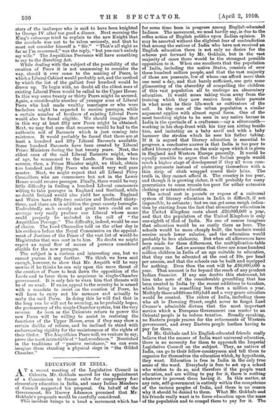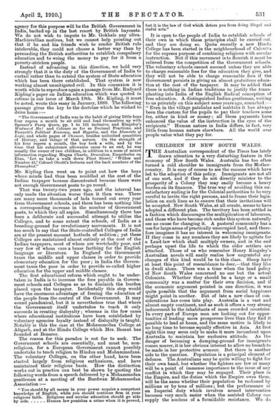EDUCATION DI INDIA.
AT a recent meeting of the Legislative Council in Calcutta Mr. Gokhale moved for the appointment of a Commission to frame rules for compulsory fres elementary education in India, and many Indian Members of Council supported his proposal. On behalf of the Government, Sir Harvey Adamson promised that Mr. Golthale's proposals would be carefully considered. This incident brings to a head a movement which has for some time been in progress among English-educated Indians. The movement, we need hardly say, is due to the reflex action of English politics upon Indian opinion. It may be asserted without the slightest fear of contradiction that among the natives of India who have not received an English education there is not only no desire for the scheme put forward by Mr. Gokhale, but in the vast majority of cases there would be the strongest possible opposition to it. When one recollects that the population of India, including the native States, consists of over three hundred million people, and that the vast majority of these are peasants, few of whom can afford more than one meal a day, and that barely sufficient, one gets some glimmering of the absurdity of compelling the children of this vast population all to undergo an elementary education. It would mean taking them away from the training which they now receive from their parents in what must be their life-work as cultivators of the soil. In the case of the urban population a similar argument applies with almost equal force. One of the most touching sights to be seen in any native bazaar in India is the spectacle of a craftsman—say a silversmith— working in his shop-front with his tiny son sitting beside him, and imitating on a baby anvil and with a baby hammer the strokes which he sees his father taking. If it is argued that literary education is essential to progress, a conclusive answer is that India is too poor to afford literary education on the scale upon which it is given in England and Western Europe generally. It would be equally sensible to argue that the Indian people would reach a higher stage of development if they all wore com- plete garments instead of contenting themselves with a thin strip of cloth wrapped round their loins. The truth is, they cannot afford it. The country is too poor, and though it is growing richer, it will probably for many generations to come remain too poor for either extensive clothing or extensive education.
The actual cost in pounds or rupees of a universal system of literary education in India is difficult, if not impossible, to estimate ; but we can get some rough indica- tion by starting from the fact that elementary education in the United Kingdom costs about £20,000,000 a year, and that the population of the United Kingdom is only one-eighth of that of India. No one of course imagines that education would be so costly there as here. The schools would be more cheaply built, the teachers would receive much lower salaries, and the education would probably be less elaborate. But when all allowances have been made for these differences, the multiplication-table still comes in. Let us assume that there are some hundred million children in India of an age suitable to education, that they can be educated at the cost of 10s. per head per annum, and that the schools can be built and equipped for nothing. Even then the cost will be £50,000,000 a year. That amount is far beyond the reach of any prudent Indian financier. If any one doubts this statement, let him take note of the considerable grumbling that has been created in India by the recent additions to taxation, which bring in something less than a million a. year. Multiply those additions fiftyfold and a very grave situation would be created. The rulers of India, including those who sit in Downing Street, ought never to forget Lord Cromer's admirable dictum that the most important service which a European Government can render to an Oriental people is to reduce taxation. Broadly speaking, no Eastern people yearns for the refinements of Western government, and every Eastern people loathes having to pay for them. If Mr. Gokhale and his English-educated friends really believe that the masses of India want universal education, there is no necessity for them to approach the Imperial Legislative Council on the subject. They, as natives of India, can go to their fellow-countrymen and tell them to organise for themselves the education which, by hypothesis, they want. Education is free in India in the only true sense of the word. Everybody is free to set up a school who wishes to do so, and therefore if the people want education, and are willing to pay for it, there is nothing whatever to Prevent them having it. In this matter, at any rate, self-government is entirely within the competence of the various peoples of India, and there is no mason why it should be denied to them. What Mr. Gokhale and his friends really want is to force education upon the mass of the population and to compel them to pay for it. The agency for this purpose will be the British Government in India, backed up in the last resort by British bayonets. We do not wish to impute to Mr. Gokhale any ultra- Machiavellian motives, but we cannot help pointing out that if he and his friends wish to render British rule intolerable, they could not choose a better way than by persuading the British authorities to establish compulsory education and to wring the money to pay for it from a poverty-stricken people. - Instead of advancing in this direction, we hold very strongly that it is the duty of the Government of India to 'curtail rather than to extend the system of State education which has been there established. That system is now working almost unmitigated evil. In this connexion it is worth while to reproduce again a passage from Mr. Rudyard Kipling's paper on Indian education which was quoted in extenso in our issue of March 19th. Mr. Kipling, it must be noted, wrote this essay in January, 1888. The following passage gives the key to the doctrine which he wished to drive home :— " The Government of India was in the habit of giving little boys four rupees a month to sit still and load themselves up with Spenser's Paery Queen, pp. 1 to 131 inclusive, and Kingsley's Westward Ho I and Colenso as far as Decimal Fractions, and Fawcett's Political Economy, and Hypatia, and the Elements of Logic, and whole pages of Chaucer, besides unlimited quantities of History, and things. of that nature. On the strength of his four rupees a month, the boy took a wife, and by the time that his subsistence allowance came to an end, he was usually the owner of two children, in addition to a mass of mixed information regarding Magna Charta, Deucalion, Empedocles on Etna, Let us take a walk down Fleet Street,' 'Wilkes and Number 45,' Colonel Olcott's lectures and the back numbers of the Theosophist."
Mr. Kipling then went on to point out how the boys whore minds had thus been muddled at the cost of the Indian taxpayer became discontented because there were not enough Government posts to go round. That was twenty-two years ago, and the interval has only made the situation worse than it then was. There are many more thousands of lads turned out every year from Government schools, and there has been nothing like a corresponding increase in the number of Government posts, to which they all aspire. Simultaneously there has been a deliberate and successful attempt to utilise the Colleges, and to some extent the schools, of India as a breeding-ground for revolutionary movements. It is not too much to say that the State-controlled Colleges of India are at the present moment hotbeds of sedition ; yet these Colleges are maintained almost entirely at the cost of the Indian taxpayers, most of whom are wretchedly poor, and very few of whom care a brass farthing for the English language or literature. In England the Government taxes the middle and upper classes in order to provide elementary education for the poor ; in India the Govern- ment taxes the poor in order to provide so-called higher education for the upper and middle classes. The first educational reform which ought to be under- taken in India is to increase the fees payable in Govern- raent schools and Colleges so as to diminish the burden placed upon the taxpayer. Incidentally this step would have the enormous advantage of freeing the education of the people from the control of the Government. It may sound paradoxical, but it is nevertheless true that where the Government itself undertakes to teach it only succeeds in creating disloyalty ; whereas in the few cases where educational institutions have been established by voluntary agencies loyalty instead of disloyalty is taught. Notably is this the case at the Mohammedan College at Aligarh, and at the Hindu College which Mrs. Besant has founded at Benares.
The reason for this paradox is not far to seek. The Government schools are essentially, and must be, non- religious, for a European Government cannot possibly undertake to teach religion to Hindus and Mohammedans. The voluntarv Colleges, on the other hand, have been started largely from religious enthusiasm, and have maintained their religious basis. How the distinction works out in practice can best be shown by quoting the following words from a speech delivered by a Mohammedan gentleman at a meeting of the Burdwan Mohammedan Association :— "You should by all means in your power acquire a competent knowledge of English, while you should continue firm in your religious faith. Religious and secular education should go side
by side Human law punishes a crime when it is proved, but it is the law of God which deters you from doing illegal and sinful acts."
It is open to the people of India to establish schools of their own in which these principles shall be carried out, and they are doing so. Quite recently a new Hindu College has been started in the neighbourhood of Calcutta for the express purpose of combining religious with secular instruction. But if this movement is to flourish it must be relieved from the competition of the Government schools. The voluntary schools cannot succeed unless they are able to charge reasonable fees for the education they give, and they will not be able to charge reasonable fees if the Government persists in giving an almost gratuitous educa- tion at the cost of the taxpayer. It may be added that there is nothing in Indian traditions to justify the trans- planting into India of the English Radical conception of free education. A distinguished Indian gentleman, writing to us privately on this subject some years ago, remarked :— "Even in the village patshalas and maktabs it has always been the custom for the pupils to pay their teachers some fee, either in kind or money ; all these payments have enhanced the value of the instruction in the eyes of the recipients." Human nature in India differs, in fact, very little from human nature elsewhere. All the world over people value what they pay for.











































 Previous page
Previous page